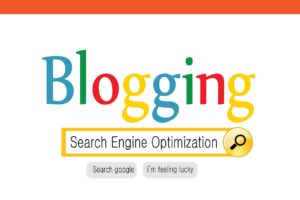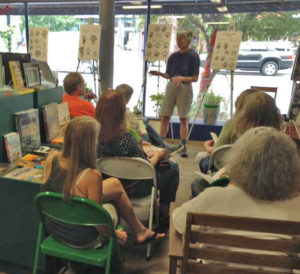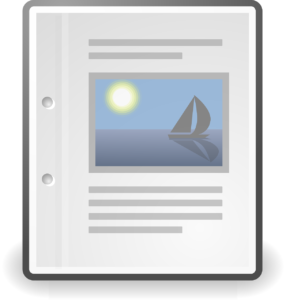 Does an author really need to blog? Not necessarily. If you are writing fiction or a children’s storybook, probably not. If you’re writing nonfiction or memoir, probably so.
Does an author really need to blog? Not necessarily. If you are writing fiction or a children’s storybook, probably not. If you’re writing nonfiction or memoir, probably so.
To answer the question, you must ask yourself whether you can reach the audience who will buy your book with a blog. Children rarely make consumer choices about books, but their parents do. Tina L. Peterson wrote a middle-grade novel, Oscar and the Amazing Gravity Repellent. She has a Ph.D. in mass media and communications and is an activist for media literacy. In Media Parentis is where she blogs about smartphones and sleep deprivation, Superbowl Advertising Bingo, and why we need diverse children’s literature. If you have a way to speak to those who buy books like yours, then a blog may be a tool to pull customers to your writing. If you are writing for wildlife naturalists who spend the majority of their time in the field in remote locations like Linda J. Spielman, then you likely don’t need to blog because your customers aren’t likely to be searching online for A Field Guide to Tracking Mammals in the Northeast. But if your book is about a nonfiction subject on which people use search engines to seek out new information, then blogging can be an important instrument in your author’s bag toolkit.
 Blogging serves two purposes. One, it helps search engines keep your site at the top of the list of hits when someone types in your keywords. Every time you post a blog, the search engines re-rank your site because the algorithms include recency as one of the variables. That helps you and your book get found online. Two, your writing will pull readers to your work. The age of mass media has come nearly to an end as notions of broadcasting far and wide like a megaphone—one-to-many—becomes less and less effective in pushing messages. Today, the communication models are many-to-many and instead of pushing, try pulling. Your writing needs to pull readers in. Interesting. Compelling. Captivating. Hook ‘em.
Blogging serves two purposes. One, it helps search engines keep your site at the top of the list of hits when someone types in your keywords. Every time you post a blog, the search engines re-rank your site because the algorithms include recency as one of the variables. That helps you and your book get found online. Two, your writing will pull readers to your work. The age of mass media has come nearly to an end as notions of broadcasting far and wide like a megaphone—one-to-many—becomes less and less effective in pushing messages. Today, the communication models are many-to-many and instead of pushing, try pulling. Your writing needs to pull readers in. Interesting. Compelling. Captivating. Hook ‘em.
Your blog can play an important role in bringing book-buying customers into the sales funnel. Interested readers become invested in your work. Cultivating relationships with readers becomes a way to recruit your advance sales team. Those who sign-up for your blog posts have opted-in to learning more about you, your work, and your forthcoming book.
 If you are going to blog and are beginning to build your audience platform, I recommend you post a 500-1000 word blog once a week for six months. Thirty days before launch and sixty days after launch, your blogs will largely focus on author events and readers responses/reactions/reviews. Once your book has published for six months, then you can cut back to once a month and after a year from publication date, once a season.
If you are going to blog and are beginning to build your audience platform, I recommend you post a 500-1000 word blog once a week for six months. Thirty days before launch and sixty days after launch, your blogs will largely focus on author events and readers responses/reactions/reviews. Once your book has published for six months, then you can cut back to once a month and after a year from publication date, once a season.
So, if you need to blog, what should you blog about?
Whether you are an aspiring author or published your book a year ago, you can always review new books. The titles you consider for your comparative title analysis are books you can write about on your blog.
If the content of your book includes people and places, you may want to write up character portraits and sketches of setting/scene that do not appear verbatim in the book, but give the reader related content.
 Attend author events at your favorite bookstores and write about the author and the book and the bookstore. Include photographs. And when you post your blogs, be sure to let the people and places in the post know so they will share it, too.
Attend author events at your favorite bookstores and write about the author and the book and the bookstore. Include photographs. And when you post your blogs, be sure to let the people and places in the post know so they will share it, too.
Write about book festivals or writing conferences you attend. Who you heard speak and what you learned.
Writing about writing isn’t all that interesting except to other writers. Unless your audience is primarily other writers (not readers) and you have mastered your craft, it isn’t recommend you write about writing on your blog.
Are there possibilities for crowdsourcing some of your research? Elizabeth Rynecki blogged about her great-grandfather’s artwork and her online presence has made identification of more of his art works possible. Read Chasing Portraits: A Great Granddaughter’s Quest for Her Lost Art Legacy.
If you have not yet published your book, then it is important for you to know the content of your manuscript should not be blogged. Publishers are reluctant to invest six figures into a product that is available for free online. If your book has recently been released, you may want to include a short excerpt on your website. Choose something which will entice a reader to want more.
 One more caveat to blogging and publication. You may decide you want to try to get short essays or books reviews published in literary journals, newspapers, or magazines. Many publications do not want material that has previously appeared online elsewhere. So if you want to get the writing published, don’t post it on your blog.
One more caveat to blogging and publication. You may decide you want to try to get short essays or books reviews published in literary journals, newspapers, or magazines. Many publications do not want material that has previously appeared online elsewhere. So if you want to get the writing published, don’t post it on your blog.
Your blog should serve more than one purpose for you as a writer. The time you spend writing blogs is time you are not writing, rewriting, revising, and editing your book. So have a strategy. When you begin, let it help you build towards a book proposal and a vision for what your book needs to be as a product that fills the needs of customers. Get to know your readers. Narrators who know their audience have an easier time writing the narration. Who are these customers? A blog will give you a good sense of the market potential for your book concept.
 Your blog strategy should include keywords if you are a nonfiction writer or plan to package your fiction or memoir into a particular keyhole in the marketplace of books. For example, Cathryn Prince and Ruta Sepetys have written two popular books about a historical event. The keyword phrase is the Wilhelm Gustloff. The name of a ship that went down in the Baltic at the end of WWII with more dead than perished on the Titanic. Cathryn wrote Death in the Baltic: The World War II Sinking of the Wilhelm Gustloff and Ruta wrote Salt to the Sea. From their titles alone you can see the importance of keywords for nonfiction compared to historical fiction. When blogging during the writing phase of her book, Cathryn Prince used Wilhelm Gustloff intentionally and to good effect. You cannot use a search engine without her authoritative account in English of this event popping to the top of the list under Wilhelm Gustloff. Nonfiction writers need to blog with a strategic use of search terms. What questions will people type into the search field to get the information in your book?
Your blog strategy should include keywords if you are a nonfiction writer or plan to package your fiction or memoir into a particular keyhole in the marketplace of books. For example, Cathryn Prince and Ruta Sepetys have written two popular books about a historical event. The keyword phrase is the Wilhelm Gustloff. The name of a ship that went down in the Baltic at the end of WWII with more dead than perished on the Titanic. Cathryn wrote Death in the Baltic: The World War II Sinking of the Wilhelm Gustloff and Ruta wrote Salt to the Sea. From their titles alone you can see the importance of keywords for nonfiction compared to historical fiction. When blogging during the writing phase of her book, Cathryn Prince used Wilhelm Gustloff intentionally and to good effect. You cannot use a search engine without her authoritative account in English of this event popping to the top of the list under Wilhelm Gustloff. Nonfiction writers need to blog with a strategic use of search terms. What questions will people type into the search field to get the information in your book?
 The most important advice for new bloggers is to be authentic. Be you. Write in first-person and conversationally. Imagine talking to a best friend or with your book club. Blogging is an effective strategy for branding yourself as an author. Readers like to get to know an author has a distinct personality which may be similar to the narrator or one of the characters in the book.
The most important advice for new bloggers is to be authentic. Be you. Write in first-person and conversationally. Imagine talking to a best friend or with your book club. Blogging is an effective strategy for branding yourself as an author. Readers like to get to know an author has a distinct personality which may be similar to the narrator or one of the characters in the book.
Build up a dozen extra blog posts in your queue. Then you don’t have to worry about throwing something together for a deadline. Book reviews and essays aren’t timely, so you can plan ahead. You might be inspired to write now in January for a subject related to an essay on June strawberries because national magazines have deadlines six months in advance. If the piece is rejected from the magazine, pitch it again and if you can’t sell it, then use it as a blog in June.
As your writing coach, I know there are times when you don’t need the distraction of blogging to make progress on your book manuscript. It pulls you out of the project and it’s a different kind of writing. Have a backlog of blogs ready to auto-post on a schedule. This gives you more control as a writer of the ebbs and flows of demands on your time.
![]() You can learn a lot about blogging by reading other bloggers in your subject area or subgenre. Subscribe to the blogs you like and learn from as a reader and writer. Leave comments where you find your tribe. Initially blogging takes a considerable amount of time. Estimate 5-10 hours a week. For the first month. Then bring it under 5 hours a week for the next six months as you add social media into the mix and share your blog posts across platforms. Hopefully, you can limit the time you spend blogging to two hours a week on a 500-1000 word post until your book comes out.
You can learn a lot about blogging by reading other bloggers in your subject area or subgenre. Subscribe to the blogs you like and learn from as a reader and writer. Leave comments where you find your tribe. Initially blogging takes a considerable amount of time. Estimate 5-10 hours a week. For the first month. Then bring it under 5 hours a week for the next six months as you add social media into the mix and share your blog posts across platforms. Hopefully, you can limit the time you spend blogging to two hours a week on a 500-1000 word post until your book comes out.
Do as much reading as you do writing when you are on task of blogging. Good writers read good writing. See what works for others on their blogs. What grabs your attention? What keeps you reading?
 And end your blog with an invitation for the reader to respond. Ask a question. Request some action on behalf of the reader. Have a “call to action.” Blogging is about engagement with readers. Don’t ignore comments for days or weeks, respond and engage. Take the high road in your response. Thank the reader for reading and responding. Even if they have nothing good to say, say something good to them. Practice kindness with your customers. You’ll attract more. If you’re a blogger, what works best for you?
And end your blog with an invitation for the reader to respond. Ask a question. Request some action on behalf of the reader. Have a “call to action.” Blogging is about engagement with readers. Don’t ignore comments for days or weeks, respond and engage. Take the high road in your response. Thank the reader for reading and responding. Even if they have nothing good to say, say something good to them. Practice kindness with your customers. You’ll attract more. If you’re a blogger, what works best for you?

Thanks for this reminder of why I’m blogging. It helps me stay focused and remember who my audience is. What to blog about is often a head-scratcher when you do it every single week. I look for the highlight of my week as a person journeying through the vast jungly continent of grief. It’s usually something I’m sure others have tangled with or will be traipsing through as well. But every once in a while I need to just vent about something else, something I’m not sure anyone else will relate to. More often than not, when I’ve written a blog I’m not sure about, I’ll be surprised by how many people respond to it.